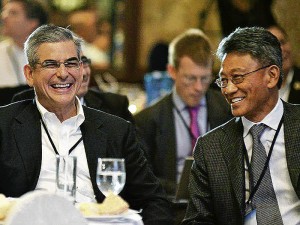
AYALA Corp. chair and CEO Jaime Augusto Zobel de Ayala (left) and PhilDev chair Dado Banatao (right) share a passion for helping Filipino entrepreneurs become globally competitive through innovation.
For the longest time, being an entrepreneur in the Philippines meant engaging in businesses that bought and resold products, or provided a service in a particular locale, or offering relatively low value-added products and services to an undemanding public.
For the most part, the risks borne by Filipino entrepreneurs looked modest compared to those carried by their Western counterparts – especially in the IT-based businesses in the United States – where most would either succeed or fail in a spectacular fashion.
“That’s why the country is the way it is. There are a lot of people shortcuts here: The easy buck,” says Dado Banatao who chairs the US-based Philippine Development Foundation (PhilDev) of the Ayala group of companies.
“If you want to stay in a business that has, at most, a 5-to 8-percent gross profit margin, and that makes you happy, fine,” he says during a recent interview with SundayBiz.
“But if you want to improve your lot, you have to get on with this value-based kinds of businesses that utilize technology, because that’s the only place where you can get 50, 60, up to 80 percent profit margins,” adds Banatao, who is also one of the most recognized names in the US’ Silicon Valley technology investment scene.
Banatao points out that while a significant number of jobs are created by the manufacturing and service industries in the Philippines, like the business process outsourcing sector, businessmen must find more sustainable entrepreneurial models – something that can only be achieved by training Filipinos to innovate early on in the lives of their businesses.
“As poor as we are here, we are exporting money, giving it to the rich countries,” he adds, explaining that the country is primarily a consumer of innovative products and services provided by other countries which stand higher up in the innovation ladder.
“That pisses me off every time, because I think we are capable of this same feat,” Banatao says.
To address this situation, PhilDev – formerly known as Ayala Foundation USA –recently convened Philippine leaders in the fields of business, education and government to map out a plan that aims to train Filipino to think with an innovative mindset and shed the so-called “rent-seeking” entrepreneurial models that have always been popular locally.
During the event, over 400 participants gathered to discuss concrete ways to achieve economic growth, specifically through entrepreneurship and innovation.
The forum also presented the challenges and opportunities in innovation as well as the capacity of the Philippines to build and strengthen its entrepreneurial potential.
The event kicked off with a message from President Benigno Aquino III, delivered by Science and Technology Secretary Mario Montejo. President Aquino was present during the first ever PhilDev Forum and Gala held in San Jose, California last year, where he pledged his support for the goals of PhilDev to build an ecosystem of science, technology and entrepreneurship for lasting economic and social growth. In his message for the forum this year, President Aquino reaffirmed his commitment to the organization’s mission.
“PhilDev has properly chosen the theme for this forum: Innovation and Entrepreneurship for a Globally Competitive Philippines,” Montejo says, quoting the President. “Innovation can lead to the creation of wealth, adding values to goods and services. It can create more livelihood opportunities for our countrymen in rural areas suffering from low income generating activities. Innovation propels entrepreneurship which can help our people become good, productive, profitable businessmen.”
In an interview with SundayBiz, Ayala Corp. chairman and CEO Jaime Augusto Zobel de Ayala points out that the conglomerate has long been a believer in innovation as a force multiplier for business, and now wants to share this mindset with the rest of the country.
“This is an exciting front because there are really not that many entities in this country that are focused on science and technology,” he says, describing PhilDev’s pro-technology and pro-innovation evangelism.
Despite the Philippines having a weak history of using science and technology as a tool for driving the business scene, Zobel says that the worldwide scene is evolving in a way that makes it impossible for the country to ignore these factors if it wants to remain competitive.
“Whether we have been there historically or not, is less important that the fact that we have to be engaged in science and technology and innovation more than ever before,” he says.
Zobel stresses that the Filipinos are not lacking in potentially talented people who can stand toe-to-toe with the best innovators in the world – citing Banatao as an example – but says that the entire country could afford to give more emphasis to science and technology education given its present status.
Will the present generation live to see the benefits of this renewed thrust toward innovation?
It could be a long wait, the Ayala chief says, but adds: “We tend to think long term.”
If this works – once this works – the Philippines may very well find itself as a leader in business innovation. To that end, the PhilDev and the Ayala group are laying the groundwork and planting the seeds now.